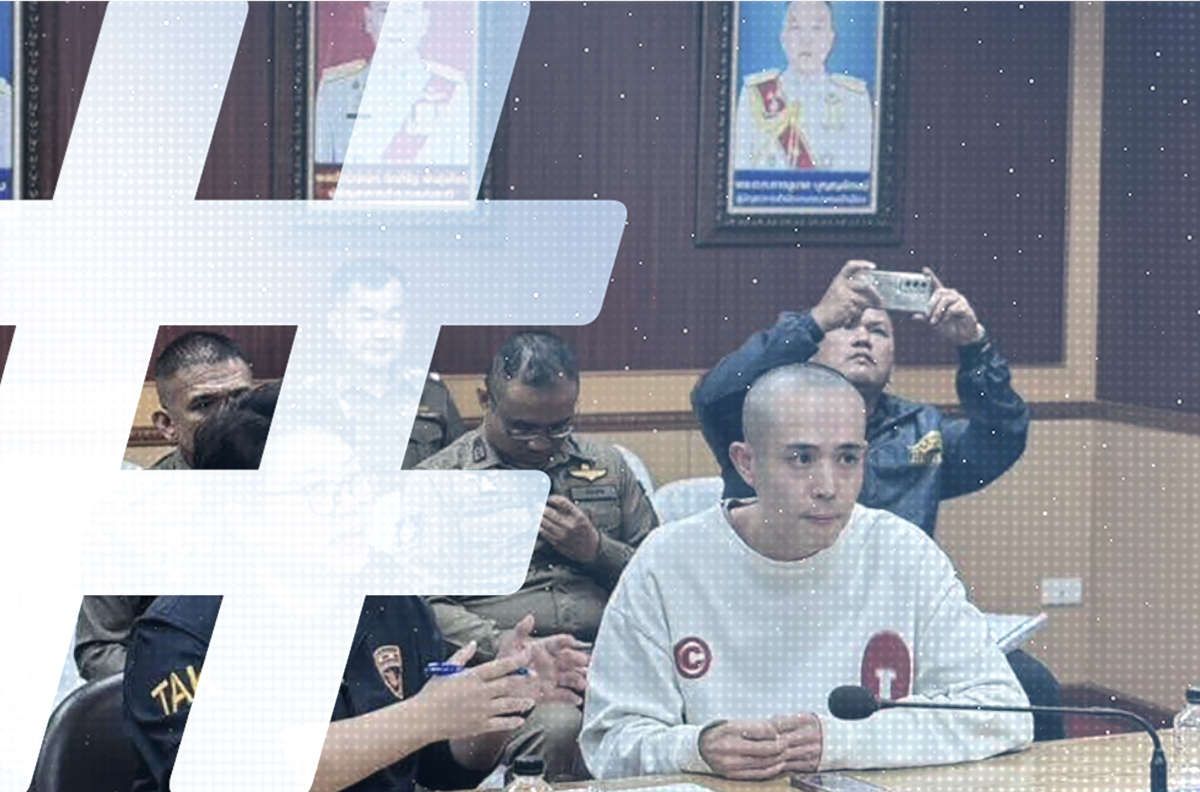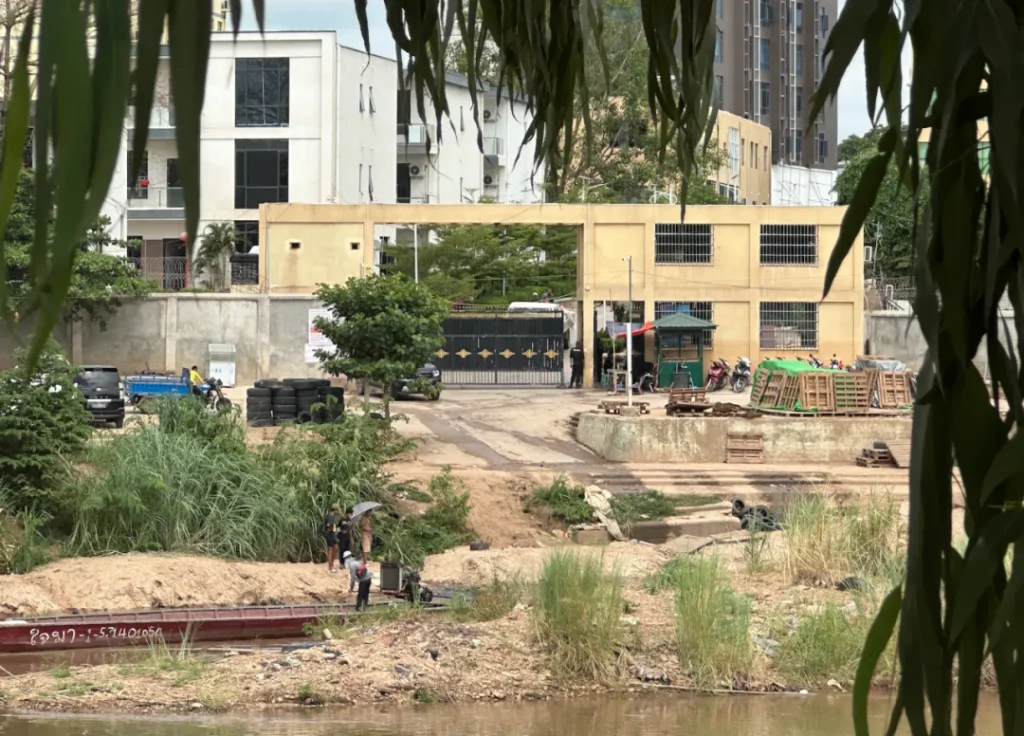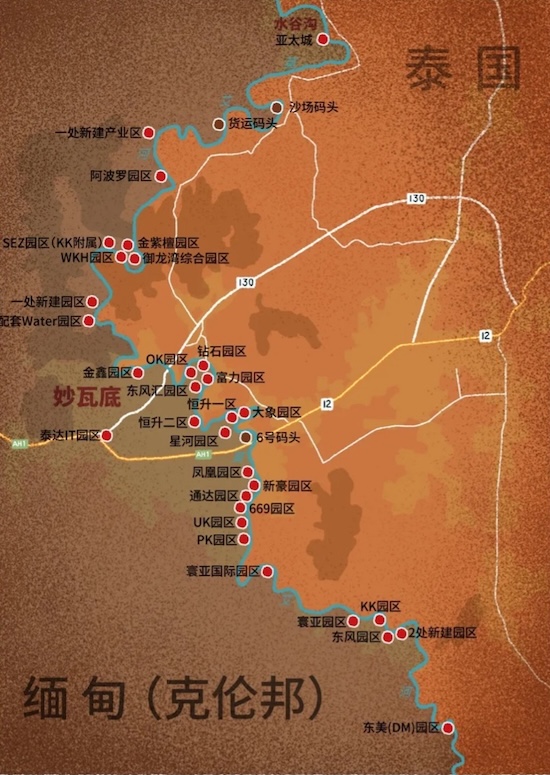Uncovering the Scam Industry
In a deeply reported investigation published on January 16, independent journalist Wu Qin (伍勤) provided rare insight into the cyber scam industry along the Myanmar-Thailand border. In recent years, thousands have been trafficked to compounds run by criminal gangs on the Myanmar side and forced to engage in online fraud. The issue was given greater public attention in China and across the region last month as it emerged that a well-known Chinese actor, Wang Xing (王星), had been abducted while in Thailand and held for three days in a compound across the border in Myanmar.
Wu’s independently-funded story, which was published through the WeChat based outlet Positive Connections (正面连接), required months of on-the-ground reporting in Mae Sot, on the Thailand side of the Moei River. It takes an intimate look at the complex infrastructure and mechanics of criminal operations in the region, and draws on a wide range of sources — Chinese victims, Thai Chinese brokers, Myanmar Chinese who secure land for operations from ethnic armed groups, immigration and border authorities, and others. The piece is also especially noteworthy for how it questions the Chinese public discourse on the scam industry, which has focused blame on Southeast Asian countries despite the fact that Chinese criminal groups are at the heart of operations.
Launched in 2021 by Zeng Ming (曾鸣), who we interviewed previously at the China Media Project, Positive Connections is a media outlet focused on nonfiction writing. The outlet’s goal is to “present important aspects of the complex world to which people generally turn a blind eye.”
A partial translation of Wu Qin’s story is available below. For the full story, see the original at Positive Connections (archived).
__________
“200 Days Investigating the Cyber Scam Industry on the Myanmar-Thailand Border”
By Wu Qin (伍勤)
The Myanmar-Thailand border has become a “lawless zone.” Warlord rule has resulted in a governance vacuum, while Thailand has become a transportation hub with the local Chinese population paving the way. On the Thai side, Thai Chinese have connections with immigration authorities, local police, and border patrol, while [on the opposite side of the border] Myanmar Chinese have ties with ethnic armed groups that enable them to secure land for enclosed compounds. Collectively, these factors have formed the infrastructure for evading governance. And they have allowed the cyber scam industry to develop and flourish. Into this zone, the “remnants” of global capitalism have been either attracted or kidnapped.
When popular actor [Wang Xing] was lured into the scam compounds of the town of Myawaddy on the Myanmar-Thailand border [last month], the case brought renewed attention to the Mae Sot-Myawaddy region, which gained some infamy previously through the [2023] film “No More Bets” (孤注一掷). The momentum of the story encouraged more victims’ families to speak out, and social media teemed with cases of individuals who had “disappeared” in Southeast Asia. One result of this was a new wave of demonization of Southeast Asia in Chinese public discourse.
The news [about Wang Xing] has also continued to percolate through media in Myanmar and Thailand, becoming one of the most hotly discussed topics in the Myanmar-Thailand region. But quite distinct from the “Southeast Asia phobia” (东南亚恐惧症) that has mushroomed in the public discourse in China, local people in the region have focused more on the question of how it is that while gangs from China (中国黑帮) set up in the Myanmar-Thailand border to engage in “cyber scams” — kidnapping people from China and other countries — it is largely Thailand and Myanmar that have borne the consequences in public perception, both being associated more closely internationally with “cyber fraud” (电信诈骗).
I have frequently visited Mae Sot since late 2023 to research the cyber fraud industry on the Myanmar-Thailand border. Located on Thailand’s westernmost border, Mae Sot faces Myawaddy across the water, and the town is an unavoidable stop on the path to the cyber fraud compounds on the opposite side of the river. Everything reaches [these compounds] from Mae Sot — whether the people inside, supplies such as electricity, internet connections, or daily necessities.
Over two years, I witnessed several key moments in this industry along the border. In late 2023, during a joint government crackdown by China and Thailand on the cyber fraud industry along the Myanmar-Thailand border, many people held captive in Myawaddy were rescued. Since 2024, however, the situation has not significantly improved, and the flow of capital and people on this border has regained momentum after only a brief pause. From compounds in Cambodia and Laos, new companies have relocated to the area — while others have shifted to compounds located in northern Myanmar, or in Dubai. People lured to Thailand from around the world continued, meanwhile, to steadily arrive and ultimately “disappear” in the compounds of Mae Sot.
Over more than a year of fieldwork in Mae Sot, I conducted many interviews with cyber scam workers, human trafficking victims, and others from the compounds across the river. They were suppliers, drivers, receptionists, agents, smugglers, and ferrymen. I observed the physical and cyber spaces along the border over an extended period, always endeavoring to answer the question: Why here? What is the infrastructure that has enabled evading governance, and made possible the cycle of smuggling, human trafficking, and modern slavery?
Finding Le Geweibai (寻找勒格伟佰)
The river that divides Thailand and Myanmar here is called the Moei River (莫艾河) by Thai people and the Thaung Yin (荡茵河) by the people of Myanmar.
This river, which serves as the boundary between the two nations, becomes as shallow and narrow as a large ditch during the dry season — making it a natural route for smuggling, illegal crossings, and sanctuary. During the months when the river floods, villagers living close to the river from time to time can glimpse bodies floating on its surface. Those who live in conditions of modern slavery in cyber scam compounds are treated as disposable. The bodies are buried during the dry season, but during the rainy season they are simply cast into the river, where the high currents wash them away.
When bodies drift to the Thailand side, border patrols — having no interest in establishing the nationality of missing persons — simply have them pushed back toward the Myanmar side. On the Myanmar side, the Kayin State is volatile, controlled by divided ethnic armed forces. In recent years, as the cyber scam industry has ravaged the border region, these ethnic forces have jockeyed to protect various scam compounds, offering protection to these lawless zones. The bodies, therefore, are simply shoved back and forth on the current between the two banks, decomposing in the crudely divided border river until they are just organic matter floating in the water.
This is the border. Mae Sot stands on the Thai side, while the compounds huddle along the Myanmar side of the border river, concentrated in Myawaddy.
One afternoon in early May 2024, I left downtown Mae Sot, following a map provided by Le Geweibai (勒格伟佰)), a youth from the Yi ethnic group who was inside a compound. I found my way to a cargo dock beside the Moei River. Directly across was the Baisheng compound (百盛园区) on the Myawaddy side — where Le Geweibai and others were being held captive. The dock was buzzing with activity, containers being loaded in batches for transport to the other side. From pagodas across the river, the sound of Buddhist chanting wafted over, mixed with the constant hum of cargo engines. Fearing unwanted attention, I gazed across from a distance, trying to locate buildings matching those in the photos sent to me by Le Geweibai.
Le Geweibai and Le Gexiaoluo (勒格小洛) had originally been working together in the city of Nanjing [in China’s Jiangsu province]. In early April 2024, unremitting rain in Nanjing halted work at the construction site where they were employed, cutting off their income. When ridesharing near the construction site, they met a Han Chinese “agent” who told them there were high-paying jobs available in Myanmar. Many young people from their hometown in Meigu County [in China’s Sichuan province] had “worked” before in Myanmar, and some had later returned themselves as “agents” to recruit others. Weibai and Xiaoluo were familiar with the idea of work in Myanmar. They hesitated for a few days but finally decided to meet again with the Han agent in Kunming. There, they were taken to Xishuangbanna [on China’s border with Laos and Myanmar] and put on a vehicle.
On April 12, Ri Bu (日布), who lives in the city of Xichang (西昌) [in Sichuan province], received a video call from his brother Weibai, who told him he was already in Myawaddy. On the screen at the other end of the line, Weibai and Xiaoluo were confined to a room. Realizing they had fallen victim to a scam, they refused to work. The company then demanded they call home for ransom. This is the way it works in some compounds. For those who are “deceptively recruited” (骗招) and refuse to work, there is a window of time allowed for them to reach out to family and arrange for ransom, which they refer to as “compensation” (赔付).
“Compensation” is a common rule in cyber scam compounds along the Myanmar-Thailand border. If someone wishes to leave the company before completing their contract period, they must compensate the company for the travel expenses, smuggler fees, and military bribes that were paid for their arrival. In these closed compounds, moreover, one cannot simply walk out on their own. Leaving can only happen if the company arranges smuggler escorts. But compensation and the rule of transport differ by company. Some companies, for example, have six-month contracts, while others have one-year contracts. Some demand compensation of around 100,000 yuan [14,000 dollars to arrange transport], while others demand rates as high as 300-400,000 yuan. The process generally entails layers of exploitation by agents. Worse even, some companies refuse to release people even after receiving compensation.
The company holding Weibai and Xiaoluo company initially demanded more than 300,000 yuan, then lowered the amount to 100,000, and finally to 80,000. But for an Yi ethnic farming family like Weibai’s, this was still an incredible sum. Ri Bu, moreover, had no guarantee that his brother would be released if they paid the ransom. Desperate, Xiaoluo and Weibai tried escaping by leaping from the building where they were being held. But they were caught and dragged back.
Ri Bu made reports on the situation to local police at both the township and country level [in Sichuan] where the two young men were from, but no case was filed. This all happened about three months after the media frenzy whipped up by the release of “No More Bets,” which had prompted a major rescue operation by Chinese police in Myawaddy. After he heard that I was doing research in Mae Sot, Ri Bu reached out to me for help.
Xiaoluo sent me a WeChat voice message. “The company is forcing us to do scam work,” he said. “If I refuse, they’ll beat me to death, but if I do it, I’ll receive jail time when I get home.” The only advice I could give is that they should treat it like a regular job and focus on staying alive. Weibai lost hope more rapidly. “My family has no money,” he told me. “I’ll just stay here. I can’t fault my parents or my family — I’ll just bear this myself.”
When I phoned the Chinese consulate in Chiang Mai, they only registered their names. To this day, there has been no follow up. The two Yi young men had no passports and no entry records in Thailand, so there was no way I could help by reporting the case to Thai police.
Most victims who are ‘deceptively recruited’ from China’s western regions have never possessed passports. Typically, they travel first to the border in Yunnan or Guangxi provinces. There, they are put on vehicles and smuggled away on a journey that meanders between multiple national borders, through mountainous terrain. Whether on the China or Thailand borders, Myanmar’s frontier regions are controlled by civilian armed forces, making passage difficult. For this reason, even traveling by land from the China-Myanmar border in northern Myanmar to the Thailand-Myanmar border in eastern Myanmar requires transit through Thailand.
Transports departing from Yunnan pass sometimes through Laos, and at other times enter northern Myanmar directly. Those departing from Guangxi must first transit Vietnam before entering Laos. Both routes terminate in the Golden Triangle region at the intersection of Myanmar, Thailand, and Laos, where they can enter Mae Sai County in Thailand’s Chiang Rai Province. Once in Thailand, the vehicles at last can travel on main roads, continuing south until they reach Mae Sot.
Those victims “deceptively recruited” who possess passports may first fly to Bangkok. Wang Xing, [the abducted actor], was an example of this. Once his flight landed in Bangkok, he was taken by vehicle to Mae Sot, a journey of six to seven hours that ended in the parking lot of the local Makro supermarket, a frequent location for smugglers to make handoffs. From there, it would have been a half hour’s drive in another vehicle to the crossing point on the Moei River.
In the end, they all “disappear” in Mae Sot.





